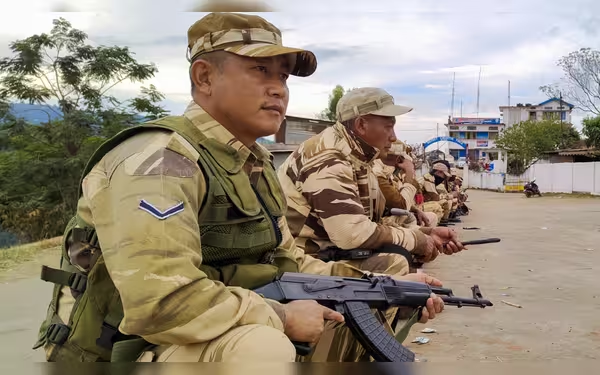Saturday, November 16, 2024 07:36 PM
Naga Separatists Threaten Violence Resumption in India
- Naga separatists threaten to resume violence after ceasefire.
- Accusations against Indian government for failing commitments.
- Call for third-party intervention to resolve deadlock.
 Image Credits: arabnewspk
Image Credits: arabnewspkNaga separatists threaten violence resumption in India, accusing government of failing commitments and calling for third-party intervention.
In a significant development, an armed separatist group in India’s northeastern state of Nagaland has threatened to resume violent armed resistance after nearly three decades of ceasefire. This alarming announcement comes as the National Socialist Council of Nagaland (Isak-Muivah), a prominent separatist organization, accuses the Indian government of failing to uphold its commitments made in previous agreements.
The Naga insurgency, which is recognized as India’s oldest, seeks to establish a separate homeland known as Nagalim. This proposed territory would unite parts of India’s mountainous northeast with regions in neighboring Myanmar, specifically for the ethnic Naga people. Since the conflict began in 1947, approximately 20,000 lives have been lost, highlighting the severe impact of this long-standing struggle.
A ceasefire was established between the National Socialist Council of Nagaland (Isak-Muivah) and Indian security forces in 1997, and a significant agreement was signed in 2015 aimed at resolving the ongoing demands of the separatists. However, negotiations have stalled since then. In a recent statement, Thuingaleng Muivah, the group’s chief, expressed deep frustration, accusing the Indian government of a “betrayal of the letter and spirit” of the 2015 agreement.
Muivah has called upon Prime Minister Narendra Modi’s federal government to “respect and honor” the 2015 agreement, which he claims “officially recognized and acknowledged” the right to a sovereign flag and constitution for the Naga separatists. He has also suggested the need for “third party intervention” to break the deadlock, warning that violence would resume if “such a political initiative was rejected.”
In his statement, Muivah emphasized that any violent confrontation between India and Nagalim would be a direct result of what he termed the “deliberate betrayal and breach of commitment” by the Indian leadership. He further stated, “India and its leadership shall be held responsible for the catastrophic and adverse situation that will arise out of the violent armed conflict between India and Nagalim.”
This situation raises critical questions about the future of peace in the region. The Naga people have long sought recognition and autonomy, and the failure to address their grievances could lead to a resurgence of violence, which would have devastating consequences for both the Naga community and the Indian state. As the world watches, it is essential for all parties involved to engage in meaningful dialogue to prevent a return to conflict and to seek a peaceful resolution that respects the rights and aspirations of the Naga people.













